Uplifting the Next Generation of Women in STEM
Physicist Indara Suarez serves as a mentor for women and underrepresented students
Physicist Indara Suarez serves as a mentor for women and underrepresented students
Assistant Professor of Physics Indara Suarez is uplifting the next generation of women in STEM by creating a lab environment that promotes diversity, inclusion, and community through teaching and mentorship.
Suarez researches dark matter and the very nature of the universe while leading and inspiring a cohort of undergraduate researchers composed entirely of women.

In 2021, Suarez was awarded the Early Career Award from the US Department of Energy to utilize the data from the Compact Muon Solenoid (CMS) experiment at the Large Hadron Collider (LHC) located at the European Organization for Nuclear Research (CERN) in Switzerland. Because of this funding, her lab has become one of the top contributors to this experiment, allowing the undergraduate women in Suarez’s lab to conduct experimental particle physics research to help pave the way.
“We wanted to establish a mentoring program for women and underrepresented students to facilitate their participation in LHC research starting at the early stages of their undergraduate career,” said Suarez’s Postdoctoral Scholar Daniel Spitzbart. “In the process, we were hoping to create a community where the students would develop research skills and be encouraged to pursue STEM careers.”
Undergraduates Hayden Bronson (CAS’23), Jade Chismar (CAS’23), Maxine Phillips (CAS’23), Chloe Grubb (ENG’23), Sabrina Bardowell (CAS’23), and Anna Mei (CAS’23) work in the Suarez Lab, contributing efforts to electronics development and data analysis for the CMS experiment.

In 2022, Chismar and Grubb presented their research at the BU Undergraduate Research Opportunities Program (UROP) Symposium and The Conference for Undergraduate Women in Physics, respectively. By 2030, the hardware and software they refined for the Muon Endcap 0 Segment Finder (ME0SF) project will be implemented into the firmware for the muon electronics, making valuable contributions to the functionality of the CMS experiment in Switzerland.
The impact of being a woman surrounded mainly by women in a high-energy physics research environment cannot be understated. There are 40 percent fewer women than men in STEM occupations in the United States, leaving some women to feel excluded or undervalued.
Suarez’s students are encouraged to explore their interests in STEM and gain confidence in a field typically dominated by men, showing them the value of their unique perspectives and presence in the field.

Each of them are set to graduate this May, and they’ve racked up a long list of acceptances to prestigious graduate programs where they will further their physics studies.
Mei joined Suarez’s group in her freshman year. The opportunity to research high-energy physics throughout her time in undergrad shaped her ambitions and goals for the future.
“While working I discovered my interest in physics research, especially in the theoretical aspects, which guided me to the decision to pursue a higher degree in theoretical physics,” Mei said.
Mei’s work on particle scattering analysis for the CMS project with Professor Suarez has earned her acceptance to graduate school at Harvard, where she will study theoretical High Energy Physics.
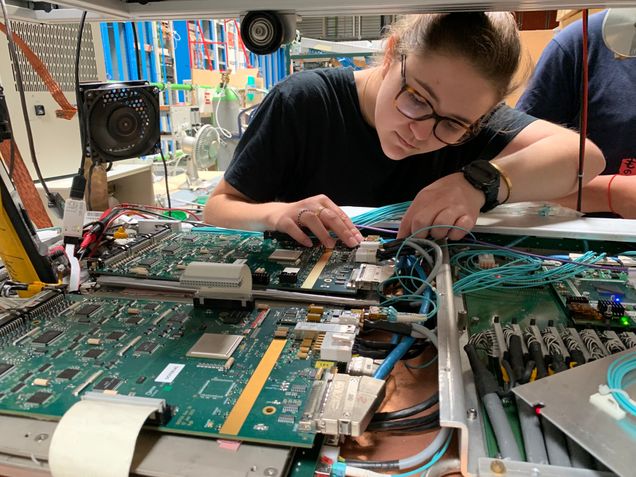
Phillips accepted a job in the Federal Physics Patent Office, a path she chose based on the guidance and opportunities she had working with Suarez on hardware development over the last four years.
“She helped me with getting internships and connected me with some of her colleagues,” Phillips said. “She plays the role of strict mentor while also building personal relationships beyond the lab setting.”
The women in the Suarez lab value and benefit from the rich relationships they develop with each other, recalling fond memories of Dia de Los Muertos celebrations and group bike rides on the Charles River Esplanade during BU’s Learn From Anywhere semesters.

“We’re all friends,” said Bronson, “We’ve been together for four years. It’s helped us learn from each other and build community.”
While Bronson was studying abroad in Geneva, she sought guidance from Suarez when she needed help developing a research project that aligned with her goals and interests. With Suarez’s continued guidance and mentorship during her graduate school application process, Bronson will continue her research in High Energy Physics at the University of Pennsylvania in the fall.
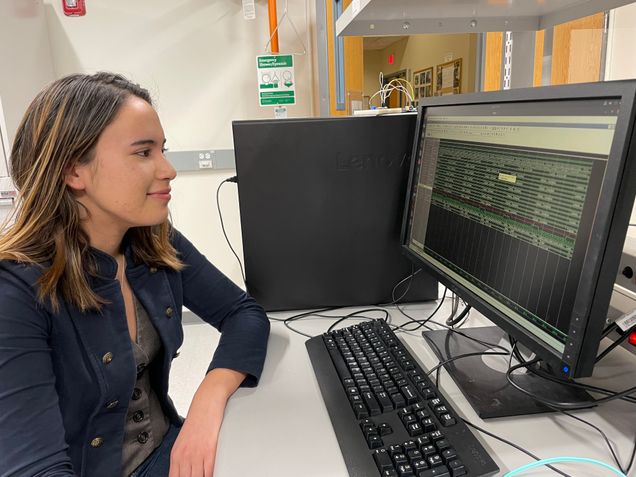
During her freshman year, Grubb cultivated a personal relationship with Professor Suarez in her PY211 class by attending office hours. When Suarez began working on an engineering project in her lab later that year, she turned to Grubb to give her the opportunity to work on electronics design for the ME0SF project alongside Andrew Peck of the BU Electronics Design Facility
“Because I was a biomedical engineering student in a physics lab, I got more hands-on experience doing engineering, playing a big role in developing hardware for the ME0SF project,” Grubb said. “I had opportunities to join engineering labs, but I stayed at the Suarez lab because of the mentorship and initiative I was given on the project.”
Grubb is taking her experience, skills, and knowledge to work in the medical devices industry after she graduates in May.
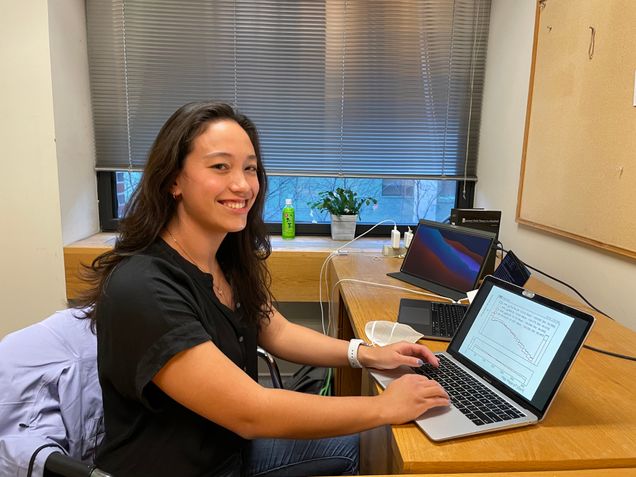
Chismar joined the Suarez lab in the summer before her junior year. She helped improve the performance of the segment finding firmware for theME0SF project, refining what Grubb started.
After graduation, Chismar hopes to become a professor, and is set to pursue a PhD in High Energy Particle Physics at the University of California, San Diego.
Bardwell, who will be pursuing a PhD in Astronomy at Northeastern University, said she is grateful for the mentorship of Suarez, as well as Daniel, her postdoctoral mentor.
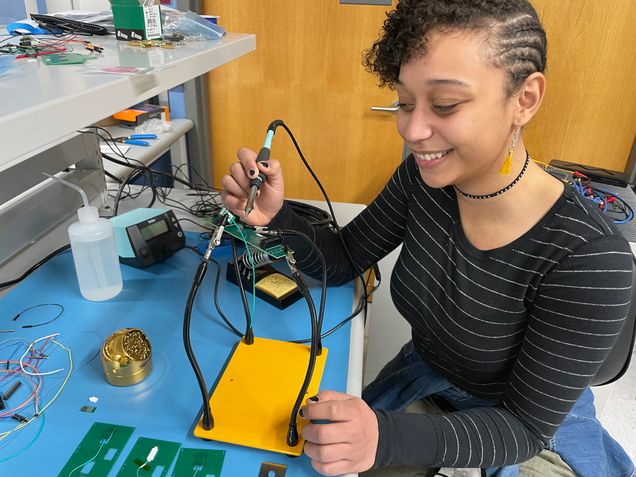
“Nothing I can say about Daniel will convey how fantastic and patient he really is. He taught us so much about particle physics,” she said. “When my classmates and I were just learning about the group, we’d gather in a huge crowd around his desk and he’d go through code with us line by line. He’s always answered our questions thoroughly and in a way that we could easily understand. He went above and beyond while helping us and is part of what makes the group so great.”

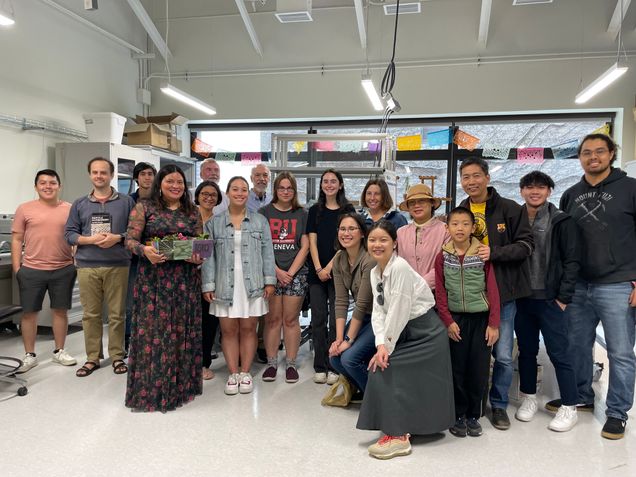
As Mei, Phillips, Bronson, Bardwell, Grubb, and Chismar move on from BU to their next endeavors, they have the opportunity to build a world where women drive and thrive in STEM careers.
Equipped with the foundations of community, inclusivity, knowledge and research experience, Suarez’s students are poised to uplift and inspire the next generation of women in physics.
“Working in a cohort of women in STEM has encouraged me to stick with physics. It can be very disheartening when noticing the lack of women in physics, both historically and currently,” says Chismar. “But working in a group primarily made up of women gave me the reassurance and confidence that I belonged in the field.”